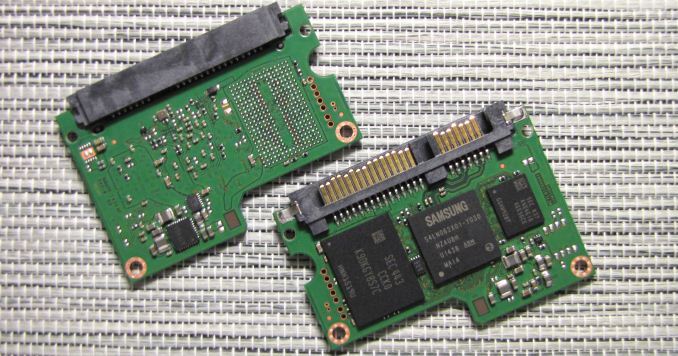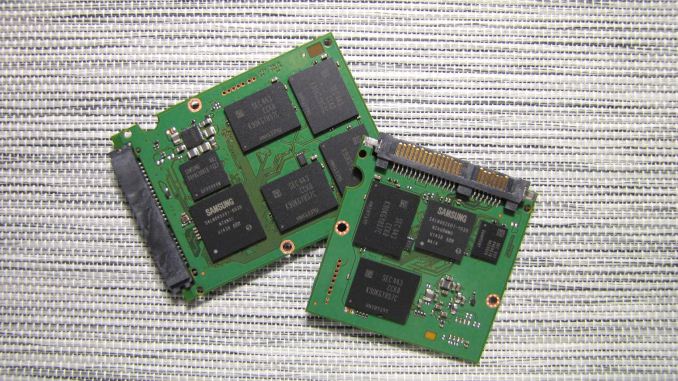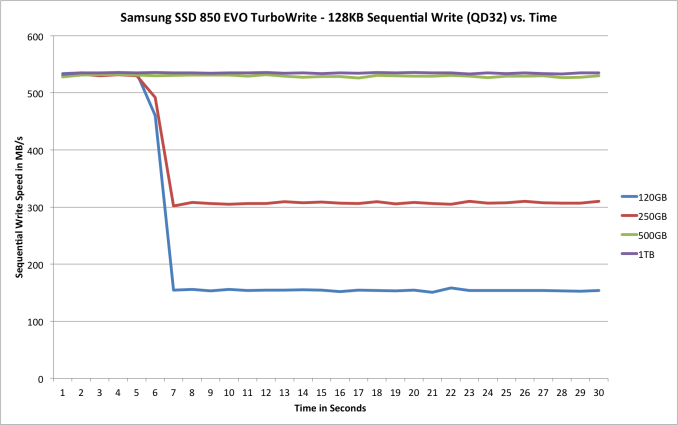Samsung SSD 850 EVO (120GB, 250GB, 500GB & 1TB) Review
by Kristian Vättö on December 8, 2014 10:00 AM ESTInside The Drives
There are three different PCB designs in the 850 EVO lineup. The 120GB and 250GB models (above) use a tiny PCB with room for two NAND packages (one on each side). Interestingly enough, both use octal-die packages, meaning that the 120GB 850 EVO only has a single 128GB (8*16GB) NAND package. Decoding the part number reveals that the packages are equipped with eight chip enablers (CEs), so a single NAND package is viable since all eight dies can be accessed simultaneously.
The use of octal-die packages is actually true for all capacities. It's an interesting choice nevertheless, but I suspect Samsung's packaging technology is advanced and mature enough that it's more cost efficient to use high die count packages and small PCBs instead of larger PCBs with more and less dense NAND packages.
| Samsung SSD 850 EVO NAND Configurations | ||||
| Capacity | 120GB | 250GB | 500GB | 1TB |
| # of NAND Packages | 1 | 2 | 4 | 8 |
| # of Die Per Package | 8 | 8 | 8 | 8 |
| Total # of Die | 8 | 16 | 32 | 64 |
| Die Capacity | 128Gbit | 128Gbit | 128Gbit | 128Gbit |
| Raw NAND Capacity | 128GiB | 256GiB | 512GiB | 1024GiB |
| Over-Provisioning | 12.7% | 9.1% | 9.1% | 9.1% |
TurboWrite
TurboWrite is a feature that Samsung brought to the 840 EVO to increase write performance. The idea of running a small portion of the NAND in SLC mode was nothing new, but it was the first time it truly made sense because the 840 EVO used slower TLC NAND and hence the SLC buffer could provide significant improvements to write performance and user experience. Unsurprisingly, TurboWrite is also present in the 850 EVO.
| Samsung SSD 850 EVO TurboWrite SLC Buffer Size | ||||
| Capacity | 120GB | 250GB | 500GB | 1TB |
| TurboWrite Buffer Size | 3GB | 3GB | 6GB | 12GB |
The buffer sizes and core architecture have remained unchanged. All writes hit the SLC buffer first, from which they then get moved to the TLC array during idle time. The only exception is a case of long, sustained period of writes that exceeds the buffer size, in which case the data will be written straight to the TLC portion.
| Write Performance With and Without TurboWrite | ||||
| With TurboWrite | Without TurboWrite | |||
| Sequential Write | 4KB Random Write (QD32) | Sequential Write | 4KB Random Write (QD32) | |
| 120GB | 520MB/s | 88K IOPS | 150MB/s | 38K IOPS |
| 250GB | 520MB/s | 88K IOPS | 300MB/s | 70K IOPS |
| 500GB | 520MB/s | 90K IOPS | 500MB/s | 80K IOPS |
| 1TB | 520MB/s | 90K IOPS | 520MB/s | 80K IOPS |
Samsung's reviewer's guide states that the 850 EVO features "enhanced TurboWrite technology" with a focus on random write performance, but I don't have any additional details as to how the TurboWrite implementation in the 850 EVO differs from the 840 EVO. TurboWrite was always designed to cache all writes regardless of the nature of the write (random vs sequential), so I'm not sure if anything has actually changed. Obviously the algorithms have been optimized for the new NAND and controller architecture and it's possible that the whole batch of algorithms has improved in the process, but I'll provide an update when I hear back from Samsung.
I ran a quick sequential write test to see how TurboWrite behaves in the 850 EVO. At smaller capacities it clearly provides a tremendous performance boost, but at 500GB and 1TB there is enough NAND to provide the parallelism that is needed to max out the SATA 6Gbps interface. That is a big improvement over the 840 EVO as its write performance maxed out at ~400MB/s when writing to the TLC array, so the performance benefits of 3D NAND technology are already evident.













97 Comments
View All Comments
Kevin G - Monday, December 8, 2014 - link
What version is the firmware of the 840 EVO? There is a notorious bug out there that'll drastically reduce the speed of the drive when it attempts to read data.See:
http://www.anandtech.com/show/8617/samsung-release...
romrunning - Monday, December 8, 2014 - link
That's the bug about reading really old data. If he did an upgrade, then it wouldn't be really old data on the new drive.It also doesn't apply to the point he was making - would I subjectively "feel" the difference if I upgrade to the 850 EVO from an older <insert_brand_here> SSD?
doggghouse - Monday, December 8, 2014 - link
On one of these review sites, they mentioned that the step up from HDD to SSD is enormous, but between the different generations of SSD the difference isn't nearly as noticeable. Depending on the test, the difference between HDD and SSD is anywhere from 2.5x faster (ex. sequential write) to 140x faster (ex. random write). You definitely will not see such a marked improvement going from one SSD to another.Also I agree with your point about the benchmarks being pointless for the average user. A lot of the benchmarks are geared towards enterprise usage. I think part of the problem is that the drives all behave pretty similarly (compared to HDD anyway), until they are pushed to the extremes. That's the only way for the reviews to differentiate between them, unless they find a particular weak point or flaw.
eanazag - Monday, December 8, 2014 - link
The performance profile of the drives and your workload will dictate if you notice the better performance. I would guess that you got a lot more GBs/$ when you picked up the Evo versus the Corsair drive. Also, not you don't need to struggle to get everything on to your boot drive. At the same time your computer may only startup 2 or 3 seconds faster.They don't for an average user, but if you're here there's a good chance you're not an average user. And those fancy benchmark numbers cost you what?
There are real life workloads that will benefit for an average user. I have seen the consistency play out in my usage in various drives. I have seen garbage collection routines cause some painful performance issues in software encrypted drives.
MrSpadge - Monday, December 8, 2014 - link
With a half-decent SSD your I/O is probalby mostly CPU-limited in the real world anyway.ummduh - Monday, December 8, 2014 - link
In my opinion, the best reason to continue to upgrade, is capacity increases.My first drive was 60GB, my second is 120GB, looks like my third is going to be 250GB....
No the speed difference isn't that drastic once you get off the HDD, but now you can start keeping more and more stuff on a drive at the same price point. All of my drives have been at the $150 point.. (Ok, so I had 3 different 60GB drives, but that was due to not realizing how bad OCZ suuuuuucked and I kept going back like a moron)
cm2187 - Tuesday, December 9, 2014 - link
The other thing is that most SSDs now are limited by the SATA interface. And to be honest, unless you are running a database with thousands of queries per seconds, beating the SATA interface won't really add much to your experience. Larger capacities I think would be more useful.Badelhas - Thursday, December 11, 2014 - link
Thats exactly what I always think when I read this reviews. Altough they are great to read, for someone who already has a SSD the gains are not noticeable. I have a Vertex 3 120Gb that I bought in 2011 and been questioning myself if I would se any real gains going to a 840 Evo, for instance, since they are much newer but you just answered my question ;)matej_eu - Thursday, June 25, 2015 - link
I am in a similar situation. My first SSD was the ADATA's SP600@64GB running on SataII, I was so mesmerized by the speed of everything (boot time, installation, app run in time, ...). I really do take care of my Win installation, drivers, and apps, but in the end size was to small for boot+main drive in laptop. I bought Samsung 840 EVO@120GB, and in the recent times I thought I was going crazy, system was noticeably slowing down. I googled, and what do you now, problems, no more Samsung EVOs for me!! Buy Samsung 8x0 PRO or some other brand.milli - Monday, December 8, 2014 - link
Your Intel SSD 730 prices are wrong. They might have gone up.The price of the ARC 100 is amazing ATM. It scores very good in the '2013 Storage Bench service time' which in my experience tells the most about how SSDs feel in actual usage.